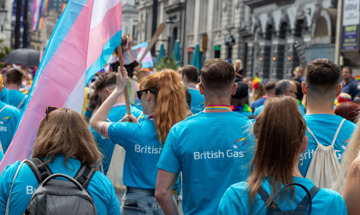Imagine what it would be like to say goodbye to a loved one headed for the front line. Or to hear the rattle of gunfire and the hiss of a bomb nearby.
For many of us reading this from the comfort of our homes and workplaces, it’s hard to comprehend. A few years ago, I got an insight into what war must’ve felt like when I read the personal stories of colleagues who lived, fought and died during the world wars whilst researching the Gas Light and Coke Company (GLCC), which is the company Centrica originated from. And on Remembrance Day, I wanted to share a reminder of the vital role colleagues played during WWI and WWII, together with the sacrifices they made so that we can lead the lives we do today.
Many brave apprentices, gas stokers and meter readers left the safety of their civic lives and overnight, morphed into soldiers fighting on the front line. The selfless duty of those in combat was recognised by the Company and they resolved that as far as possible, all jobs would remain open for their safe return whilst insurance and sickness schemes ensured that workers and their family would be supported if the worst were to happen. By the end of the WWI and WWII, 950 colleagues had sadly lost their lives.

Colleagues regularly wrote to one another and an employee by the initials C. H. R said:
“I have heard from my wife how generously the Company are treating her and it is with great comfort to know that those I have left behind are well provided for…and I know others feel the same. It is another example of the generosity of the Directors towards their employees and is one of those things which do more towards inducing men to strike a blow for England than all the patriotic songs ever written…We have had a pretty rough time of it here…Some of the sights we have seen have been awful - the dead and wounded, and houses ransacked, looted, and wrecked…Still, as I said before, we are all cheerful and happy, practically our only cares are for those we have left behind.”
Meanwhile many colleagues fuelled the war effort from home, often under battle from the skies. War not only stimulated a rising demand for energy to fuel essential manufacturing and munition factories, but the by-products of gas had become almost as important as gas itself - from paint for planes and fertilisers for farming, to medicines for the sick and wounded. Unsurprisingly energy production sites and collier ships became a number one target of our adversaries, so colleagues worked tirelessly to defend and maintain a steady supply.

Captain R. L. Jones of the ‘S.S Halo’ collier ship said: “…on my last trip but one Hitler came out from Whitby and dropped six bombs only 50 yards astern of us…But we keep bringing in the coal. It will take more than Hitler to stop us doing that. And it’s good to know, when we do safely dock, that every cargo of coal we deliver to the piers is another blow at Hitler.”
Engineers and repair gangs also worked flat out to meet rising demand. Whether installing lights in hospitals, refrigerators in submarines and cookers in barracks, or facing flames and fire as they re-connected thousands of miles of gas pipes following an aerial attack. A fast response wasn’t only vital to fuel the war effort; it helped people keep calm and carry on.
A consumer from London said: “I am dependent on gas for all heat, fire and cooking…I feel impelled to thank you all for the splendid work and organisation which has enabled these repairs to be done under such difficult circumstances. How one misses gas when it disappears!”
With war dictating increased duties and limited men available, women stepped up to adopt key responsibilities like taking meter readings and maintaining gas production. The women excelled in their new roles with the GLCC saying they’d “obliterated all manner of ancient prejudices”. These pioneering women set the standard and have paved the way for the important role women play in our industry today.
Thank you to all colleagues past and present who have served their country.

Blog
The Working Parents of Centrica
Our people

Case Study
The power in being different
Our people

Case Study
Moving for mental health: Centrica on The Road to Paris
Our people

Case Study
20 years of the Carers Network
Our people

Case Study
#UnderTheScope for LGBTQ+ History Month
Our people

Case Study
Exploring new paths - a day in the life of an apprentice
Our people
